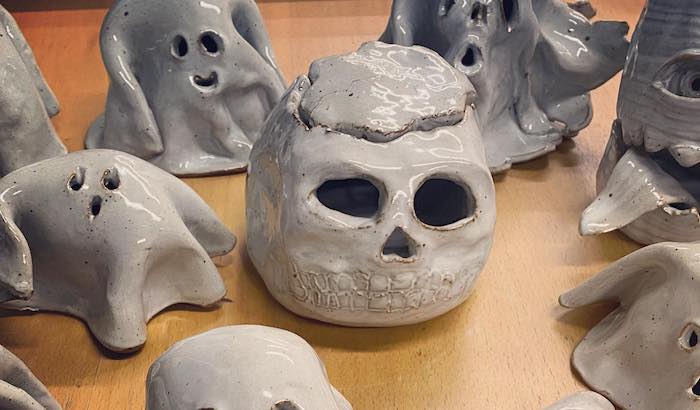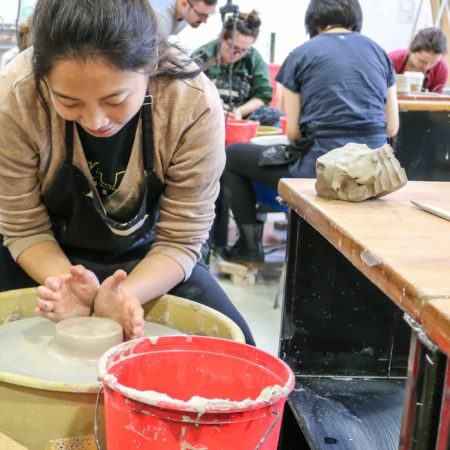
“People just had to walk away from things. You know that mug doesn’t have a handle on it, that cup is unfinished, it was just so strange.”
The space is bright, with light flowing in from the large studio windows casting shadows on the differently shaped objects on the drying rack. An abstract utensil, a figure of a man and woman, and a brightly colored pot. People walking between workstations track around clay caked into the soles of their shoes.
Just a couple months ago, this studio sat empty. Last March, Mass Gov. Charlie Baker declared a list of essential businesses that could remain open amid stay-home orders. Pottery studios were not included, forcing these spaces to cease in-person operations. Faced with no other options, local clay communities set out to navigate what came next.
Feet of Clay, a studio in Brookline, closed their doors to their students, hoping the halt in operations would be temporary. Months later, they were still shuttered. Their students—one-third retired, another third working professionals, the rest pottery students—were unable to attend in-person classes or display their work at live sales.
With a major hit to their community and the inability to sell products, more than half of the students who generated profits off commissions were unable to make money. Without craft or studio shows, there was nowhere to display their work.
“They lost so much income from all the in-person events being canceled and yet they continued to pay their memberships,” Jennifer Wyman, an artist and spokesperson for Feet of Clay, told DigBoston. More than 100 people continued to pay their memberships, while only 30% of tuition had to be given back to students.

Refunding or redistributing the money that was generated from registering was an issue all studios had to tackle. With sudden closures, semesters and registration periods ended abruptly.
Mudflat Studios, which is housed in a renovated movie theater in Somerville, had to refund most of their students and find ways to get the money they had spent for the upcoming spring semester of 2020 back to their students.
“We were not prepared for what was going to happen,” Mudflat Director of Marketing and Communications Kate Kuligowksi said. “A lot of us thought we would be shut down for two weeks.
Two weeks turned into a nearly five-month closure for the studio, beginning right as they canceled their upcoming spring sale for 2020.”
The initial closure left Kuligowski and her co-workers grappling to find a way to connect with community members and facilitate the bond they shared day in and day out when in person.
“Throughout the entire pandemic it has been a concentration of ours to keep up with students while we were at home in whatever way possible,” she said.
Mudflat got creative. The studio turned to curbside clay sales, where they would unload unused clay from the studio so their students could have materials for at-home instruction. Mudflat also hosted weekly community zooms, where they would discuss a range of topics from What’s your biggest clay catastrophe? to What’s your favorite book?
The Ceramics Program under the Office of the Arts at Harvard used similar tactics.
“It was such a strange feeling, we had so much work unfinished,” said Kathy King, director of the program. “People just had to walk away from things. You know that mug doesn’t have a handle on it, that cup is unfinished, it was just so strange.”
A branch under the college, the ceramics program had to follow Harvard in closing the doors mid-March, the same day the university did. In the interim, the program sold clay, handed out materials for online courses provided via Zoom, and hosted panels, discussions, and seminars.
Despite the offset of community members being unable to attend in-person classes and having to end the semester abruptly before their spring 2020 show (like other studios), they took the break as an opportunity.
“I never would have thought to do these things on Zoom either,” King said. “I had never even heard of it!”
The program even allowed students to engage in artist’s studio visits from their screens while sitting in their respective Cambridge homes. The program generates 80% of its revenue from registration, with the rest coming from fundraising, a show, and sales at the end of their terms. It was extra challenging without students, but King pushed to get staff and students back through their doors following a slow trickle of staff members coming in to maintain the studio space. Once the members filed into the school’s COVID-19 testing and safety system, they were able to cautiously commence operations in September of this year.
Harvard’s return was relatively late compared to studios like Mudflat and Clay of Feet, which began slowly reopening for both staff and student operations mid-summer. These studios are now wrapping their fall semesters in holiday mode, as their students and respective staff members prepare and sell their works.
UPCOMING SHOWS:
-
Feet of Clay Holiday Show (12.3 – 12.19)
-
Mudflat’s Holiday Open Studio & Pottery Sale (12.4 – 12.12)
-
Winter Show and Sale (12.9 – 12.12)
Faith is a Texas transplant attending school in Boston whose writing is centered around arts and cultural affairs.

